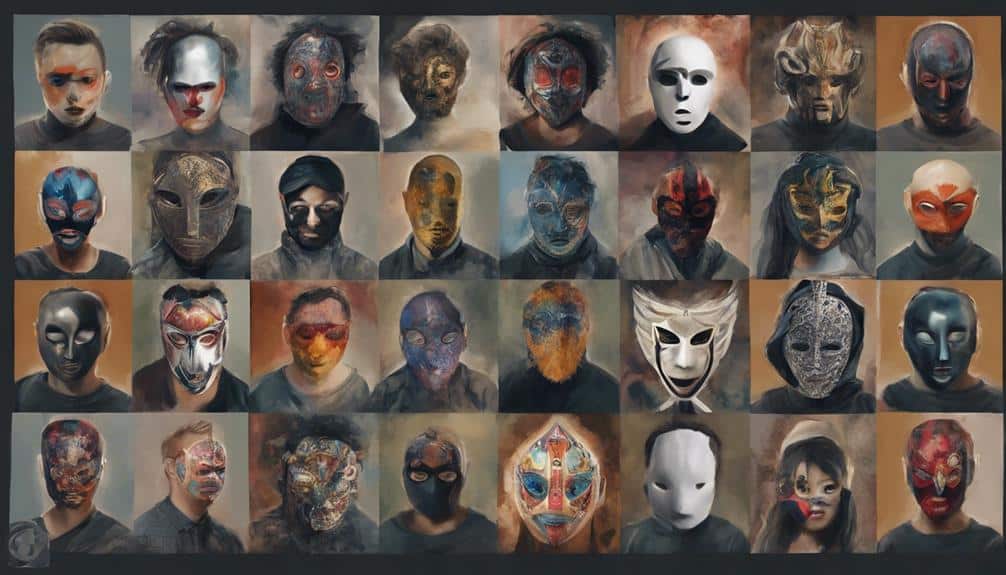Unmasking Neurodivergent
Oh, the joy of exploring a world where blending in feels like wearing a mask tailored by society's expectations.
But what happens when we decide it's time to peel back those layers and reveal our authentic selves?
The process of unmasking neurodivergent individuals is a complex journey that involves unraveling deeply ingrained behaviors and beliefs to uncover the beauty of true identity.
With each layer shed, a new chapter of self-discovery emerges, inviting us to explore the depths of our unique minds and embrace the power of authenticity.
Key Takeaways
- Unmasking allows for authentic living and meaningful connections.
- Masking impacts mental health, contributing to anxiety and depression.
- Building supportive communities fosters understanding and acceptance.
- Strategies for unmasking include seeking support and personal growth.
Understanding the Concept of Masking

Understanding the phenomenon of masking in neurodivergent individuals is essential for grasping the challenges they face in cruising societal expectations and norms. Masking, particularly prevalent in autistic individuals, involves concealing one's true identity to fit in with neurotypical standards.
This act of masking can be mentally and emotionally taxing, often leading to exhaustion, anxiety, and a sense of disconnection from one's authentic self. Research suggests that autistic masking can even result in burnout and exacerbate existing mental health issues if left unaddressed.
By recognizing and comprehending the intricacies of masking, we can better support neurodivergent individuals in their journey towards self-awareness and self-acceptance. Encouraging unmasking, which entails revealing and embracing one's genuine neurodivergent traits, is a crucial step towards fostering a more inclusive and understanding society.
Embracing authenticity and celebrating diversity within the neurodivergent community is paramount in creating a world where individuals feel empowered to be their true selves without fear of judgment or rejection.
Impact of Masking on Individuals

Masking within neurodivergent individuals can greatly impact mental health, leading to conditions like anxiety and depression. Additionally, the challenges of social acceptance that arise from masking can contribute to a sense of identity loss and diminished self-worth.
Addressing these issues is crucial to prevent burnout and make sure that individuals receive the support they need for their well-being.
Masking and Mental Health
Exhaustion, anxiety, and diminished self-worth are common consequences of masking in neurodivergent individuals, highlighting the significant impact on their mental health. Neurodivergent people mask their true selves to fit societal norms, leading to a constant struggle to appear 'neurotypical.' This internal battle can make individuals feel even more isolated and misunderstood.
Unmasking Autism, for instance, is an important step in revealing the authentic person underneath the facade created to blend in. Long-term masking not only hinders self-acceptance but also exacerbates mental health conditions like depression and anxiety.
Recognizing the toll that masking takes on mental well-being is essential in addressing the unique challenges faced by neurodivergent individuals and promoting a supportive environment that values authenticity.
Social Acceptance Challenges
The detrimental impact of masking on neurodivergent individuals extends beyond internal struggles, manifesting as significant challenges in social acceptance.
When neurodivergent individuals mask their true selves to conform to neurotypical standards, they often encounter difficulties in forming authentic social connections. This masking behavior can lead to a sense of disconnection and loneliness, as genuine relationships are hindered by the facade presented to fit societal norms.
Additionally, the pressure to mask can result in a lack of acceptance from others, exacerbating feelings of alienation within social circles. Ultimately, the struggle for social acceptance while masking one's true identity can perpetuate a cycle of emotional exhaustion and hinder the development of meaningful relationships.
Reasons for Masking Behavior

Social pressure to conform to neurotypical standards often drives neurodivergent individuals to mask their true selves. In a world where neurotypical people set the norms for social interactions, neurodivergent individuals may feel the need to mask their natural behaviors to fit into a specific mold. The fear of facing discrimination, bullying, or social rejection due to their differences can be a powerful motivator for masking behavior. The desire to be accepted and avoid being judged or misunderstood pushes many neurodivergent individuals to conceal their true identities.
Additionally, masking behavior is often adopted as a coping mechanism to navigate environments that aren't accommodating to their needs. The constant effort of pretending to be someone they aren't can be draining, leading to burnout, anxiety, and a sense of disconnection from their authentic selves. Despite the challenges, many neurodivergent individuals engage in masking to facilitate smoother social interactions and avoid standing out in a society that values conformity.
Importance of Unmasking Identity

Embracing and revealing one's neurodivergent identity is a pivotal step towards fostering self-acceptance and authenticity. Masks can weigh heavily, conforming to societal expectations, hindering one's true self from shining through. Unmasking liberates individuals, allowing them to embrace their uniqueness without fear or shame.
The Importance of Unmasking Identity:
- Self-Acceptance: Unmasking enables individuals to accept themselves fully, quirks and all, fostering a deep sense of self-worth and confidence.
- Authenticity: By shedding societal masks, individuals can live authentically, aligning their actions with their true selves, leading to more meaningful connections and relationships.
- Mental Health Benefits: Understanding the toll that masking behaviors can take on mental health underscores the importance of unmasking. Removing the facade can alleviate stress, anxiety, and depression, promoting overall well-being and emotional resilience.
Strategies for Unmasking

Unmasking one's neurodivergent identity involves intentional steps towards shedding societal expectations and revealing one's true self, paving the way for self-acceptance and authentic living. To effectively unmask, it's important to identify and let go of behaviors that have been used to camouflage neurodivergent traits. These behaviors, often developed as coping mechanisms to fit in, can hinder one's ability to express their true self authentically.
Seeking support plays an important role in the unmasking process. Therapists, support groups, and trusted individuals can provide understanding, guidance, and a safe space to explore and embrace one's neurodivergent identity. Through these supportive interactions, individuals can gain valuable insights, coping strategies, and emotional validation, enhancing their journey towards unmasking.
Understanding the consequences of masking and the benefits of unmasking is essential for personal growth. Unmasking can lead to greater self-acceptance, authenticity, and mental well-being. By actively engaging in the unmasking process and seeking support, individuals can nurture a more genuine relationship with themselves and the world around them.
Building a Supportive Community

Supportive communities play an important role in fostering understanding and acceptance for neurodivergent individuals. Being part of a community that values neurodiversity can provide a profound sense of belonging and connection. Here are three key ways in which supportive communities can positively impact neurodivergent individuals:
- Shared Experiences: Support groups and online forums offer valuable resources and a platform for neurodivergent individuals to share their experiences. This sharing creates a sense of camaraderie and understanding among members, fostering a supportive environment.
- Inclusive Events: Community gatherings focused on neurodiversity promote inclusivity and provide a safe space for neurodivergent individuals to engage with others. These events help individuals feel accepted and appreciated for their unique traits.
- Combatting Isolation: Building relationships within a supportive community can combat feelings of isolation and loneliness commonly experienced by neurodivergent individuals. These connections offer a support system that understands and embraces their differences, promoting mental well-being and a sense of community.
Frequently Asked Questions
What Is Unmasking Neurodivergent?
Unmasking neurodivergence means revealing one's authentic self, improving social interactions, mental health, and self-acceptance. It involves shedding societal masks and embracing uniqueness. Therapeutic support can aid in this process, leading to a more fulfilling life.
How Do You Know if You're Masking Neurodivergent?
I recognize signs of masking neurodivergence through changes in behavior, speech, and exhaustion. Seeking support, embracing authenticity, and self-reflection are critical in breaking free from masking. Acknowledging and addressing these behaviors is vital.
Why Do Neurodivergent People Mask?
I mask as a neurodivergent person to navigate social expectations, cope with challenges, and protect my mental health. It's a survival strategy that often leads to exhaustion and anxiety, hindering my access to necessary support.
What Is the Point of Unmasking?
The point of unmasking is to embrace authenticity, fostering self-acceptance, promoting mental well-being, and building genuine connections. Breaking free from societal norms challenges ableism, prioritizing individual needs. Ultimately, it leads to increased self-awareness, improved relationships, and empowerment.
Conclusion
To sum up, unmasking neurodivergent is a crucial journey of self-discovery and acceptance. But have you ever considered the impact of masking on mental health and well-being?
By embracing authenticity, challenging societal norms, and building a supportive community, individuals can reclaim their identity and live a more fulfilling life. It's a process that requires courage, self-awareness, and a commitment to personal growth.
Are you ready to unmask and embrace your true self?







